“The politics, strategy and tactics of addition”
NOTE: my interview with Lon Johnson’s opponent in this race, MDP Chair Mark Brewer, can be found HERE.
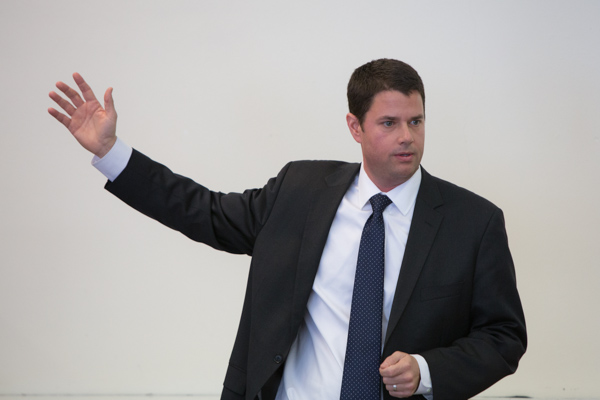
Lon Johnson addresses an overflow audience at a recent Ann Arbor Dems meeting
Lon Johnson‘s name was probably not familiar to most Michigan Democrats until he announced his candidacy for the Chair of the Michigan Democratic Party (MDP) last week. All of that changed when, in a letter from Senator Debbie Stabenow, the entire Democratic Congressional and Senatorial delegation came out in support of Johnson. Along with them, the Teamsters union and the UAW threw their support behind Johnson, as well.
Johnson ran for state House in 2012 in the very Republican 103rd district, a race he narrowly lost. A powerhouse fundraiser and verteran campaigner, he lives in Kalkaska, Michigan with his wife, Juliana Smoot, a nationally-recognized fundraising all-star herself in the Obama campaign.
Johnson got his start as a high school yearbook photographer. After being stranded at the opening of the Mazda plant in Flat Rock, Michigan, he was given a ride back to his high school by Congressman John Dingell who invited him to a Michael Dukakis rally the following weekend. After spending several hours photographing backstage with the Dean of the House, the presidential candidate, and a whole host of high-level Democrats, he told me, he was hooked.
Anne and I sat down with Johnson and his wife last weekend to discuss his candidacy, his qualifications, and his vision for the future of the MDP.
Tell us a little bit about your background.
I grew up in Rockwood and graduated from high school there in 1989. I moved out west, went to Arizona State and worked on political campaigns there starting in 1990. That was race where I didn’t really know enough about politics, but I got lucky. It was a guy running in the Democratic primary against the incumbent. At the time, I had no idea what a significant move this was. All I knew is that he was this cool guy and he asked me to get involved and he gave me real stuff to do and I just thought it was the coolest thing in the world. And he won!
He came to one of our Young Democrats meetings and he turned to me and said, “Lon Johnson! For president of the Young Democrats!” And I was like, “Hey, Dick, I’m not even registered to vote, I don’t think!” and he said, “Well, ya are now!” He just empowered me. It was a great lesson to learn about including people. I taught me that people are hungry to get engaged if you get them at the right level and capture them at the right moment. I don’t think we’re doing enough of that.
After that I started working on Congressional races. In ’92 we ran a race out of the back room of the house of a guy who running who was 35. We got outspent 3-to-1 in a 52% Republican, 36% Democratic district and we won. It was John McCain’s old seat. It was just mind-blowing and, again, reinforcing that a small group of people can really do BIG things.
Then I went to Jersey and really started to hone my craft, if you will, putting together campaigns. I was there in ’95 and ’97. In ’96 I worked on independent expenditure, largely funded by the AFL-CIO and AFSCME and a few others. In ’98 I went back to Arizona and ran the coordinated campaign and we elected Janet Napolitano for Attorney General at the time.
And then I was done with being on the road so I moved to Washington. And I was really disheartened when I got to Washington. Because nobody cared. They didn’t! “Oh, you’re a field guy? Great. Nice. That’s very nice…”
I wanted to work for Al Gore. I had a few connections but I heard the only way to get on the Gore operation was to raise money. So, I became a fundraiser! They gave me the worst territory and the worst title — “Deputy Something or Other” — and sent me to Texas under George Bush. From there I worked for Gore all of ’99 and 2000. Once he got the nomination I worked for his Leadership PAC. It was just me and Al Gore in his living room making calls.
Around December of 2001, John Dingell asked me if I would come home and run his primary against Lynn Rivers.
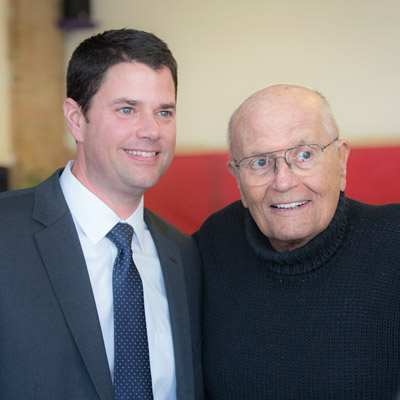
Was that what brought you back to Michigan?
Yeah, it was a chance to come home and, frankly, when John Dingell calls, you stand at your desk, you know? I mean my family wasn’t political and everyone knew who John Dingell was. In 2003 I went back to DC to work for the Senate Democratic Campaign Committee. In ’04 I came back here and ran America Coming Together. In ’05 I went to Iraq with a group called the National Democratic Institute where we did political infrastructure building and I was there for six months.
From there I just really focused on business. I work for a firm that invests in and grows US manufacturing companies and in 2012 I decided to run for the state House. So, that’s my resumé.
Were you recruited?
No. I called Mark [Brewer] up and had a long talk about the race, the seat, about my chances, about the type of help we could get, and so forth. My life has always been about the fight to give people a voice and I was always comfortable doing that at a staffer level. I never thought I would ever run until I saw that the work that I did could be better done as an office holder. So, I thought the time had come. When I saw the dysfunction in Lansing that were caused, in part, by term limits. You know, there’s a lot of structural things that are against us.
But here’s the thing: I didn’t need training wheels. I know how to raise money. I know how to deliver a message. I know how to put together a statewide political operation. So, that’s why I decided to run.
What’s the margin up there in the 103rd district?
It’s about a 42% Democratic district. It’s a tough seat.
So, now you’re running for Chair. Were you recruited for that?
So, what happened was, I ran, I have no regrets, and I think we need to have more people fighting for every seat. We give no quarter. We make the Republicans duke it out in every single race.
An “83 County Strategy” or maybe a “110 Legislative District Strategy”…
That’s right. Like Howard Dean did it. So, after the election, a lot of people came to me with a lot of things. I started looking at the 1st Congressional District and running against Benishek and I looked at a number of different things, trying to figure out how to continue my involvement.
A number of people started talking to me about running for state Chair. Right away. And, I told them, “No, no, that’s just not for me.” Then, about two weeks ago, we were leaving the Inaugural. It was a Friday, we were getting ready to go to the airport, we were literally waiting for a cab, and I got a phone call from a member of our delegation and they asked, “Would you consider it?” Out of respect, I didn’t want to say no right away. I hung up the phone and my wife was like, “Really? You know, this is a thankless job.”
Over the weekend, from every corner of our party, I got phone calls. And these weren’t folks who loved Lon Johnson and hated Mark Brewer. These were people that knew my skills and knew what I was capable of but these weren’t people who just thought I walked on water and Mark Brewer was the devil. That’s not this. That is not the impetus. It was just people who felt and saw that it was time for a change. That’s all. And it became very apparent to me that the change that they were seeking were things that I could do. So, after a lot of soul searching and a lot of talks with my wife, I decided to throw my hat in and to do it.
How is it that the UAW and the Teamsters came to support you? I’m interested in why some unions are and some unions aren’t. I’m wondering what that division is all about.
Well, that makes two of us!
Look, I don’t think this is organic. This is not linear. Politics is not a linear game, right? And especially party politics. And especially party politics in Michigan. This is a very different state structure-wise than any other state that I’ve worked in and I’ve worked in a lot of ’em.
In what way? What do you mean by that? How is it different?
Institutions play a larger role, without a doubt.
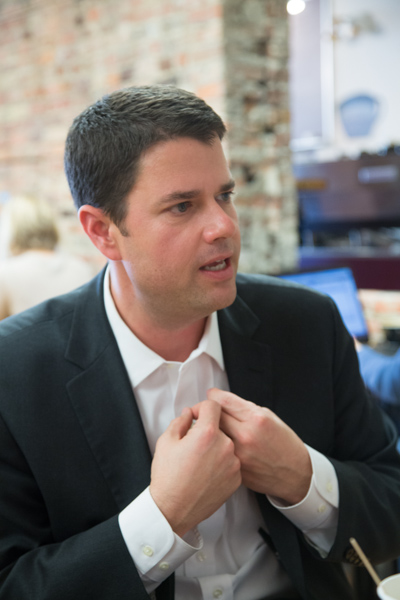
You’re talking unions, in general?
I’m talking unions. I’m talking other groups. We have a respect for institutions. I think our party does and our party activists, not only do they play a larger role, but we see the value in institutions because there is a great value in them. We are a better party because of it.
That being said, though, we need a Michigan party that can stand on its own, that can be in addition to the UAW. Be in addition to the MEA. Be in addition to the environmental community.
Most of the criticism that I hear about the MDP coming from insiders is that the UAW runs the show. So, it doesn’t really matter who is in charge because the UAW controls everything. I saw that myself because I wanted to be a delegate to the Democratic National Convention and unless you’re on the Labor slate, you don’t even get considered. You have to be on the Labor slate to get elected. What are your thoughts on that? Is that appropriate and, if not, what do we do about it?
I think the Michigan Democratic Party has to be an equal partner. When you look at the institutions of our state, and primarily labor, they need an equal partner. We’re up against powerful interests. Look what happened in Wisconsin. A third of their members were cut, were gone. The Michigan Democratic Party can no longer rely on any one organization or any one institution to succeed. What this race is about, and what I’m about, is this: at the end of the day, what politics is about is the art of addition. At all levels. Politics is the art of addition. You add, you do not subtract.
So, what we’ve got to do is take this terrific foundation that we already have — I mean, look, the voters are with us. We’re winning in this state. So we’ve got the voters with us and we’ve got incredible allies. How do we add more allies to the table? That is the question. Not, “How do we minimize labor, the UAW, the Teamsters, or AFSCME or SEIU?” That is not the debate. The fact that we’re even debating that is destructive. What we need to look at is how do we bring the Michigan Democratic Party to be an organization that can bring all of those organizations together but bring more to the table, bring more people to the table.
That’s the debate that should be occurring. To look backwards or to talk about subtraction or limiting the power of any organization, I think is, again, not the politics of addition. It’s not how we win.
Do you think the unions will kiss and make up afterwards?
Look, I can tell you that the only three letters I care about are W-I-N. And I think those are three letters that any organization cares about: W-I-N.
I DO think that the UAW control over the MDP is a big deal that can’t be ignored and I don’t think they’re going to give up that power lightly. They do swing a huge club when it comes to what goes on in the MDP right now. So, it will be interesting to see how that plays out. If you were to take over, I think you’d get a lot of pushback if you try to diminish their ability to call the shots.
You make any calls about me and people will tell you that I am not a UAW man. One thing that will become crystal clear if you call around is that I am independent. I am my own person. I have no desire to come in and create a structure that’s answerable to only one organization or one institution or one faction of our party. That’s destructive and it’s how we lose. I am interested in one thing: winning. Winning. And if that upsets people, then don’t reelect me. I’m not here about being reelected. My job is to win in 2014 at whatever it is to me inside the MDP. Winning has a forgiveness all its own. That’s a lesson I have learned.
There have been no conditions laid down for any of the UAW support or Teamsters support or any of the African American support I’ve gotten or from any of the environmental groups. Nobody sits down and tells me, “We’ll support you if you do X, Y, and Z” because that’s not how we’re going to create this party and that’s not how politics works.
So, with that being said, these various groups DO bring something to the table in terms of diversifying our organization, etc. What would you see as different in how the MDP would interact with these groups, whether it’s labor or environmental or LGBT groups, that kind of thing? Do you envision any change in what’s happening right now?
 Absolutely. The key is … what the Obama campaign did beautifully was they took a supporter and turned a supporter into a volunteer. Then they took a volunteer and turned them into a contributor, a contributor into a raiser. They compounded people’s willingness to engage at every step and they made it EASY. Ya gotta make it easy, right? And the way we win is not only with a strategy of addition but with the tactics of addition and with the tools of addition. Nothing will do more for our party than bringing new people in. And the way I want to do that is through five major ways.
Absolutely. The key is … what the Obama campaign did beautifully was they took a supporter and turned a supporter into a volunteer. Then they took a volunteer and turned them into a contributor, a contributor into a raiser. They compounded people’s willingness to engage at every step and they made it EASY. Ya gotta make it easy, right? And the way we win is not only with a strategy of addition but with the tactics of addition and with the tools of addition. Nothing will do more for our party than bringing new people in. And the way I want to do that is through five major ways.
One, mechanically, structurally, we have to have a full-time Chair and a full-time Executive Director.
And we have one person doing both of those jobs right now.
Yeah. The roles of the Chair are fundraising, keeping the table together and expanding it — when I say “table” I mean the people and the organizations and the institutions, the constituency groups — keeping that table together all rowing in the same direction and expanding it and empowering.
And last, delivering the message. This isn’t just about Lon Johnson getting on tv and delivering a message. We’ve got to find the next leaders of our party and train ’em and get ’em in front of cameras.
So, with those three jobs, any one of them could be a full-time job.
Then we need somebody at the Executive Director level to run the day-to-day, to implement the goals of our table, what the party has come together to say “these are our goals, this our strategy and these are our tactics”. Hand that over with a budget to the Executive Director and go!
Second, fundraising. When we’re just a party that relies only on institutions for our funding, we atrophy and that has got to stop. We’ve got $30-50 million that is being raised out there from individuals who write checks, who contribute to parties, committees, candidates, and so forth. We have the ability to go out and get some of that money. Activists vote with their checkbooks. They choose who they’ll write their checks to.
You’re saying we have to be competitive for that money.
We gotta work for it! You know, we’re not going to get half of it. We’re not going to get 25% of it. But it should be the goal of the MDP to go out and get 10-15% of it. You know how you do that? You work. You call them. You gotta show them where their money’s going. You gotta say, “Here’s our program, we need you to help to pay for this specifically.” Show them how it benefits their concerns and their issues.
Third, increase outreach to women, minorities and young people. 2014 is going to be all about turnout and Barack Obama will not be on the ballot. We need to start right now in the African American community and it just can’t be this last 60 days fly-in and motivate because it doesn’t work that way. We’ve got to start right now with real programs generated from the community.
Give me an example of what you’re talking about, something at the community level that the MDP would help with, say in Detroit.
You know, I’ve been talking over the past week with Detroit Democratic Party leaders. First off, the African American community is not a monolith, right? You don’t just check the box and meet with three people and call it done. Geographically it’s not a monolith and within the community, just like in every community, there are centers of gravity. We have to understand the power structure there and how we can help them to help us. And it can’t be coming from the MDP or from Lansing. The MDP has to sit down and figure out together, with the African American community, what concerns the community, how we address it and how to we get it done, how do we implement those tactics we just came up with.
Number four: recruitment of candidates. Nothing transcends economic, racial or gender lines than a motivated candidate. If that man or woman thinks they’re going to lose, they’re going to work. And if we get good candidates of all stripes running, that will have a longer lasting impact on our party than anything from the MDP. We gotta go into the African American community, not just in Detroit but in communities that are 30-50% African American, that won’t get that traditional geographically-based approach, and say “we need you to run”. And if you run, here’s the tools to get the job done. Here’s funding. Here’s the structure. Here’s how you get message out. In every way, shape and form, we need to get those candidates the tools. We’ve got to do that with women, we’ve got to do that Hispanics, we’ve got to do that with lesbians and gays. We’ve got to do the politics of addition. Always come back to the politics of addition in both word and deed.
What’s number five?
Number five: technology, technology, technology.
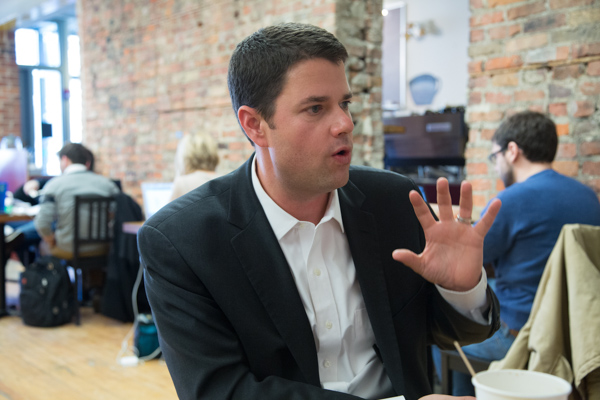
When I went down to the Obama campaign to visit my wife, it was a bunch of people that were not the “ward heeler” types. There’s a whole new way to understand what our message should be, how to deliver that message, and how people communicate with each other and we’ve got to go in and give people the tools to do that.
What the Obama campaign did so well is turn people that were fired up into the message deliverers. Until we do that, we’re going to be hostage to the tube. We’re going to be hostage to “whoever spends the most money on tv wins”. So, we’ve got to understand how we develop our message, who we target it to and how we deliver it. Technology has changed so much and we’ve got to figure that out.
So, now that Julianna’s group [OFA] has taken all of the data away from us [laugh] — Mark Brewer has talked about trying to recreate that database. Is that what you’re talking about in terms of technology?
That should have been done back in ’08. I mean, Obama in ’08, they just brought in this entire new wave of people and the fact that we didn’t grab that and easily segue that movement into 2010, well the party has to bear some of the responsibility for that. The fact that we don’t still have those folks in 2012? I constantly hear, “Where are the Obama people? They’re not coming…” Well, guess what? They’re not coming any more. Michigan is a blue state as far as the DNC is concerned. We won Michigan by 9 points and they spent almost no money here and this was Romney’s home state. What’s that tell the DNC? This is a blue state. We’re on our own at this point.
So, to think there’s going to be this OFA 3.0 to come in and save us is just wrong. We’re on our own. But the beautiful part is we’ve got the tools.
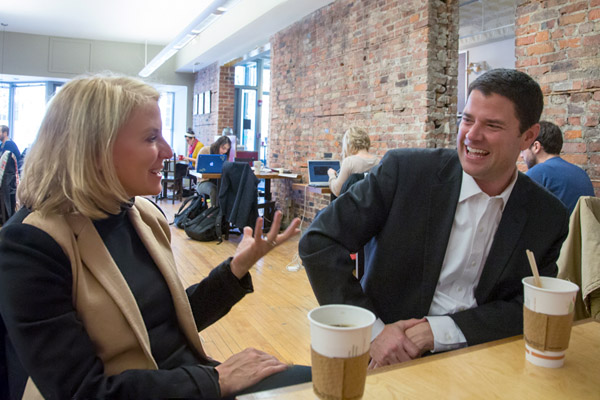
Johnson with his wife, Julianna Smoot
So, how do we do that? How do we recreate that? Because the all of the things you’re talking about in terms of technology requires that you’ve got those phone numbers and addresses and email addresses.
That’s right. Technology and a permanent campaign. We’ve got to bring the tools to the table and we’ve got to have a permanent operation out there.
An “OFM”
That’s right. Organizing for Michigan. This can’t be that we bring in the pros the last six months before in an even numbered year and when we’re done we put it in a box and break out a year and half later.
So, how do you do this?
We find the mother in Plymouth who’s angry the education cuts. We find the young activist in Kalkaska that’s upset about fracking. And we get them the tools to get the job done.
What about staffing levels at the MDP? Do you think you would hire more people or would you be able to do what you want at the current level?
Again, it’s the politics of addition on all fronts. It’s the politics, the strategy and the tactics of addition. We have great staff there. We need to add, not subtract. But you have to pay for that. The MDP has an annual operating budget of about a million and half dollars – $3 million overall and they’re running great programs. Pretty much all of that $3 million is dedicated. So my job is to go out and get more money. But I need something to sell. So, again, I sit down with the African American community and say, “What do you want to do? What do you need to do to fire up and engage the community? And we write it up and it’s my job to take the write up — the five page pdf — and go to the people who support Democrats in this state, and say, “This is a terrific program. It’s accountable. It works. Here’s the budget, here’s the tactic, here’s how it’s going to get done, here’s the timeline, here’s the metrics so we can decide if it’s a success” and people WILL write checks for that.
You can learn more about Lon Johnson and his candidacy at his website, by liking his Facebook page, and following him on Twitter.
[All photos by Anne C. Savage, special to Eclectablog]



